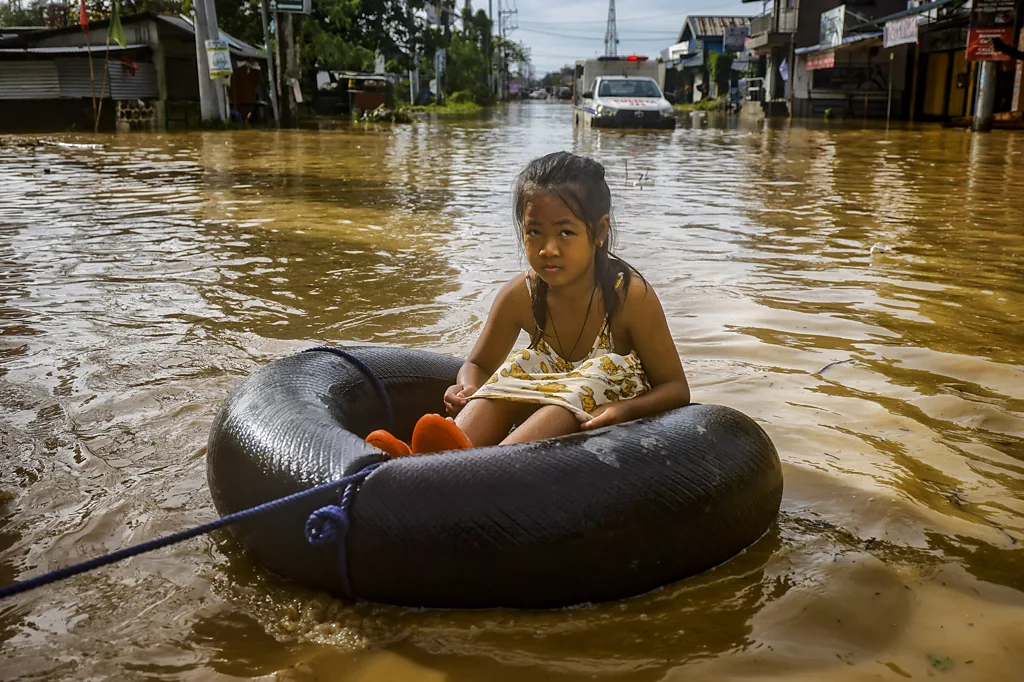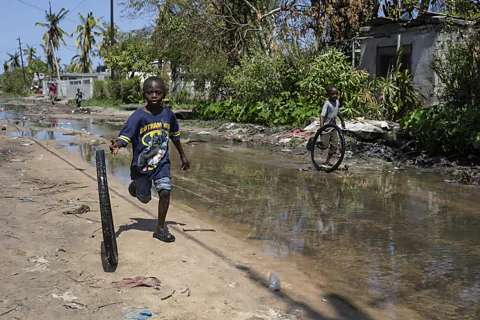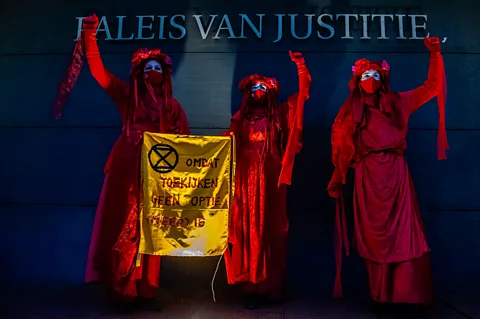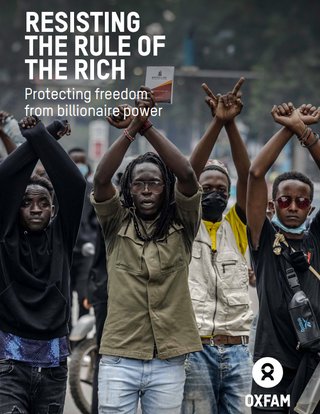Should rich countries and fossil fuel companies pay for the climate losses and damages they have caused?
The intensifying climate crisis has sparked a global debate over who should pay for the devastating losses and damages caused by extreme weather events linked to greenhouse gas emissions. With fossil fuel companies and high-emitting nations facing growing calls for accountability, efforts like Vermont's Climate Superfund Act and proposals for UN-backed finance facilities highlight a push for polluters to shoulder the costs of climate resilience and recovery for vulnerable countries.

Should rich countries and fossil fuel companies pay for the climate losses and damages they have caused?
There have been a huge number of deadly weather events in 2024. Floods, heatwaves, droughts, storms and wildfires have wreaked havoc on climate vulnerable countries including India, Brazil, Nigeria, the Philippines, and through much of West and Central Africa, claiming lives and destroying homes and livelihoods.
Climate change is making severe events more frequent. Another country to face huge climate damage in recent years: Pakistan. In August 2022, the country was devastated by catastrophic flooding.
The unprecedented monsoon rains killed more than 1,500 people and left the inundated country with economic damages exceeding $30bn (£27bn). Within a month, a scientific study had concluded the high rainfall was "likely increased" by climate change.
The link between greenhouse gas emissions and extreme weather events already happening today is now well established. Events such as Pakistan's floods, Madagascar cyclones and Somalia's drought are becoming more intense and more frequent due to climate change. They have led to death and destruction and left countries facing immense economic damages, plunging them into debt and diverting funds away from other critical areas, such as healthcare and education.
What's more, these impacts are only set to get worse. If global temperatures were to rise by 2.9C, the average GDP of the world's 65 most climate-vulnerable countries will fall by 20% by 2050 and 64% by 2100.
The US states making polluters pay
In May 2024, Vermont became the first US state to require oil and gas companies to pay for the climate damages they have caused, after signing the Climate Superfund Act into law. The law mandates polluting companies to be financially accountable for their share of climate impacts. New York is currently deliberating a similar mechanism, which would charge fossil fuel companies $3bn (£2.3bn) a year for 25 years to pay for climate damages.
The discussion of who should pay for climate losses and damages has become a major geopolitical issue and is expected to be high on the agenda at the upcoming Cop27 climate talks in Sharm el-Sheikh, Egypt, in November.
By 2030, vulnerable nations are likely to face $290-580bn (£260-520bn) in annual climate "residual damages" – damages that cannot be prevented with measures to adapt to climate threats. By 2050, the total cost of loss and damage could rise to $1-1.8tn (£890bn-1.6tn).
UN Secretary General Antonio Guterres, who has become increasingly more outspoken on the injustices of climate change in recent years, has described the climate crisis as a "case study in moral and economic justice". He argues "polluters must pay" because "vulnerable countries need meaningful action."
As such climate threats become a larger part of our lives, many argue that the countries and companies responsible for the pollution in the first place should be the ones footing bill.
So what if we lived in a world where polluters really did pay for the climate damage they have caused? How much would they need to cough up, and would these payouts signal the end of the fossil fuel industry? Would this funding ever be able to alleviate the harm done? And could it mean the world's most vulnerable countries recover from climate disasters and adapt to looming threats?
Responsibility for climate change can be seen on several different levels – the actions of governments, companies, communities and individuals can all be linked to emissions.
A study published earlier this year by Dartmouth College in New Hampshire, in the US, provided the first assessment of countries' liability in fuelling the climate crisis. It concluded that emissions from the US, the world's largest historical emitter, cost the world more than $1.9tn (£1.6tn) in climate damages between 1990 and 2014. The next four largest emitters – China, Russia, India and Brazil – caused a further $4.1tn (£3.6tn) in global economic losses in the same time period. Combined, these losses are equivalent to around 11% of yearly global GDP.
"We show that there is a scientific basis for [climate] liability claims," says Justin Mankin, co-author of the study and assistant professor of geography at Dartmouth College. "The science shows that if one country can have detectable damages; one country's foregoing [of] emissions can have detectable benefits. That's really essential… it overturns this narrative of 'what can one country do?'"
If governments were serious about covering the damage from this harm, countries could establish a loss and damage finance facility under the UN Framework Convention on Climate Change (UNFCCC) – the UN's climate change body – which they would pay into in line with their fair share, says Sadie DeCoste, an organiser for Tipping Point UK, a non-profit working on climate justice. The fair share could be calculated based on their historical and ongoing contribution to global emissions, she says.
Having the fund as part of the UNFCCC process, rather than an external body, would help it to be "accountable and transparent" and ensure it is a "collective commitment to reach an agreed-upon sum", adds DeCoste. Such a fund should not be based on voluntary commitments made only by the countries that are more willing to pay, she says.
The world's most climate-vulnerable nations have called for such a facility to be set up, which would assess countries' needs after a climate disaster and request specific funds from governments based on factors including their contribution to global heating. To date, rich countries have strongly resisted these calls, insisting that humanitarian aid is enough to deal with the issue.
 Gokhan Balci / Getty Images
Gokhan Balci / Getty ImagesFossil fuel companies are also increasingly being held accountable for their greenhouse gas emissions. A 2017 report from the CDP, a non-profit, found just 100 fossil fuel companies are responsible for producing 71% of all global greenhouse gases emitted since 1988. Another report from consultancy Profundo and non-profit Transport and Environment concluded that Europe's five biggest oil majors are responsible for some $13tn (£11.5tn) of damage in the past 30 years, including pollution, deteriorating public health and carbon emissions. These companies make enormous profits from extracting and selling fossil fuels, which have fuelled rising temperatures and exacerbated extreme weather events.
If the world's biggest fossil fuel companies were held accountable for these emissions, they could be forced to pay an annual sum, based on their share of global carbon pollution that has been emitted over the past 20 years, into a polluters-pay climate fund. This could help developing countries deal with climate impacts and the costs of transitioning to clean energy.
Polluters could also be made to pay for any ongoing emissions via an international tax on fossil fuel extraction, as proposed by a coalition of climate vulnerable nations. Here, companies would be taxed for each tonne of coal, oil or gas they extract. Starting at a low rate and increasing every year, such a tax could raise billions to help countries rebuild and recover from disasters.
"[A climate damages tax] is a way of establishing accountability and responsibility," says DeCoste. It opens up a conversation about how polluters can provide vulnerable countries with enough funding to adapt to the climate threats they are facing, she says.
Some governments today are already considering taxing the windfall profits of fossil fuel companies that benefit from high energy prices. Some of the revenues raised by such a tax could help vulnerable communities recover from extreme events, such as droughts and floods. However, a major limitation of this in the long run is that windfall taxes on fossil fuel companies are only intended to be temporary. "We need to ensure fossil fuel companies are taxed effectively and consistently all the time, not just with one-off windfall taxes," says Olivia Hanks, climate justice lead at the faith group Quakers in Britain.
However, since governments also need to set a timeline for rapid phaseout of coal, oil and gas, fossil fuel taxes could only fund climate losses and damages temporarily, says Hanks – meaning other sources of finance will also be needed to pay for climate damages.
Industries which use a lot of fossil fuels, such as aviation and bunker shipping, could also be taxed to generate the necessary funds to pay for those suffering the impacts of climate change. Unsustainable behaviours, such as frequent flying and eating red meat, could also be taxed to raise finance for countries devastated by climate change, says DeCoste. The most polluting behaviours tend to be associated with the lifestyle of a small numbers of people with very high incomes – just 1% of the global population is responsible for 50% of flying emissions, for example, while 90% of people have never flown.
Airline travel levies, which would increase with each additional flight the individual takes, are a "fair, feasible, and suitable" way to raise loss and damage funds, some researchers say. They could generate up to $5-10bn (£4-9bn) each year, be easily collected at international flight departures, and be channelled to vulnerable communities through international bodies like the Green Climate Fund, which was set up to help developing countries reduce their emissions and adapt to climate impacts.
 Joe Sohm / Getty Images
Joe Sohm / Getty ImagesRedirecting public money which currently supports polluting activities towards supporting those suffering the impacts of climate change could also make a huge difference. A recent report estimated that governments around the world currently spend a staggering $1.9tn (£1.3tn) each year on environmentally harmful subsidies, such as support for fossil fuel production and for intensive agriculture. This is equivalent to around 2% of annual global GDP – money that in many cases could instead be used to support victims of climate disasters.
Governments would play an important role in redistributing money in these ways, but the courts are another important avenue through which victims of climate disasters could compensated. Recent advances in the science of "climate attribution" are especially important here.
"Climate attribution allows us to quantify the contributions of particular fossil fuel producers on impacts such as global average temperature increase, sea level rise, and ocean acidification," says Kathy Mulvey, climate accountability campaign director at the Union of Concerned Scientists in the US.
Ongoing scientific advances in this area will enable lawyers to bring more cases against polluters, says Richard Wiles, president of the Center for Climate Integrity, an advocacy organisation in the US that works to hold polluters accountable. (Read more about why climate lawsuits are surging).
One 2014 study has been particularly influential in bringing more court cases against polluters, says Wiles. The study, written by Richard Heede from the Climate Accountability Institute, established a causal link between the actions of fossil fuel companies and climate impacts. It identified 90 fossil fuel and cement producers, dubbed the "carbon majors", as being collectively responsible for 63% of global emissions since the industrial revolution, and pinpointed the share of emissions each of these companies are responsible for.
"This was critical to getting [legal] cases off the ground," says Wiles. "[As a lawyer], you needed to be able to say that Exxon was responsible for a portion of those damages with data and that the company you're accusing of crimes can actually be proven to have contributed to the damage."
A spokesperson for ExxonMobil says the company has "long acknowledged the reality and risks of climate change and has devoted significant resources to addressing those risks."
"We have announced our ambition to achieve net zero greenhouse gas emissions for operated assets by 2050," he says, adding that the company is developing roadmaps for reducing emissions from its facilities and assets.
An important case which aims to use attribution science to sue for climate damages is a lawsuit brought by a Peruvian farmer against Germany's largest utility company, RWE. The lawsuit is the first case of its kind and could set a precedent for whether polluters should provide compensation for climate damages on a pro rata basis.
In the case, which is ongoing, farmer Saúl Luciano Lliuya aims to hold RWE accountable for the role of its emissions in melting a glacier above his hometown, Huaraz, in the Peruvian Andes. Lliuya says RWE should pay 0.47% of the cost of building flood defences to protect Huaraz – which would amount to around €20,000 (£17,600;, $19,600). The amount is based on an update to Heede's study by the Climate Accountability Institute which attributes this share of global emissions to RWE.
Lliuya's lawyers are building their case on climate attribution science, including a 2021 study which concluded that the melting of the Palcaraju glacier is "entirely attributable" to rising temperatures and that the change geometry of the glacial lake and valley has "substantially increased the outburst flood hazard".
"We have a very clear picture of climate change being responsible for creating this very large lake that now threatens a city," says Rupert Stuart-Smith, the study's lead author and a research associate in climate science and the law at the Oxford Sustainable Law Programme.
The power of precedent "could mean that we will see more and more successful claims being brought before courts," he says. These could potentially be in jurisdictions across the globe and target a great number of companies, he adds. "If corporations with large emissions can be held responsible for their impact, then it could really be a game changer for pay action [polluters paying for climate damages] in many ways."
 Luka Gonzales / Getty Images
Luka Gonzales / Getty ImagesIf court cases and taxes which made fossil fuel companies more accountable for the impact of their emissions did pile in, would this be the death knell for the industry – the end of coal, oil and gas?
It would certainly incentivise fossil fuel companies to switch to producing clean energy, such as wind and solar, instead of producing more carbon-intensive fuels, says Hanks. "If polluters knew they had to pay the full cost of their activities, we'd see the energy transition happen much faster."
Could this bankrupt fossil fuel companies? "If polluters are held responsible for the harm done as a result of their emissions, then you could be looking at vast sums of money," says Stuart-Smith. "I don't think it is unreasonable to talk about numbers in the billions of dollars. We could see payouts large enough that they would substantially impact [fossil fuel companies'] profits."
The fossil fuel industry is estimated to have made $2.8bn (£2.5bn) in profits per day over the last 50 years – $1tn (£891bn) a year and a staggering total of $52tn (£46tn). In a scenario where fossil fuel companies were asked to foot the entire bill of climate damages (projected to reach $290-580bn (£260-520bn) per year by 2030), this is equivalent to roughly 30-60% of their current annual profits.
Lawsuits can also directly impact a polluter's business model going forwards, adds Stuart-Smith. "We're seeing cases brought, for instance, challenging corporate and national emission reduction plans as inadequate," he says. A 2021 Dutch court ruling, for example, ordered Shell to reduce its emissions in line with the Paris Agreement on climate change. In November 2024, the oil giant won a landmark case after the Hague Court of Appeal overturned the earlier ruling requiring Shell to cut its carbon emissions by 45%, stating that it could not establish that the company had a "social standard of care" to reduce its emissions by any amount.
The ramifications of lawsuits go beyond any direct damages paid by the companies, says Wiles. "[The real damage] is the reputational risk and the loss of their social license." He compares this to the reputational damage the tobacco and opioid industries suffered after they were forced to disclose the health risks associated with their products and make public key documents which highlighted these. In the case of opioids, this disclosure led to hundreds of new lawsuits seeking to hold the industry accountable. This could also happen to the fossil fuel industry, Wiles notes.
For climate-vulnerable countries, funds put forward by polluters would be a lifeline. The long-term finance would allow them to invest in resilient infrastructure protecting them from extreme events, such as hurricanes and floods, as well as slow-moving threats, such as rising seas.
The money would also enable countries to strengthen their public health systems and cover the climate-related health costs, such as waterborne diseases, which are increasing due to climate change.
It could also provide compensation for workers losing jobs in polluting industries. The global coal industry, for example, is estimated to lose 4.7 million jobs in the clean energy transition, while the mining industry is expected to lose 4 million jobs. Compensation could also support workers who have lost their jobs due to climate impacts, such as farmers and fishers, says Mulvey.
 Arroyo Fernandez / Getty Images
Arroyo Fernandez / Getty ImagesMany developing countries are heavily reliant on fossil fuels to meet their energy needs and grow their economies. "But the path to development is dirty; it's industrialisation," says Mankin.
Mankin says it is unclear whether loss and damage funding would put these countries on a cleaner path and allow them to develop and at the same time adapt to climate threats. But Hanks says loss and damage finance would create "financial and decision-making space" for developing countries to focus on the energy transition, rather than having to "relentlessly deal with disaster after disaster with no money to do so".
Loss and damage finance could also make a huge difference for people who have been permanently displaced due to climate change. It is estimated that by 2050 up to 216 million people will be forced to leave their homes due to climate impacts such as water scarcity, declining crop productivity and sea-level rise.
The money could also pay for the restoration of vital ecosystems, such as mangroves and coral reefs, which have been damaged or destroyed by storms and floods and can provide vital protection against climate impacts.
CARBON COUNT
The emissions from travel it took to report this story were 0kg CO2. The digital emissions from this story are an estimated 1.2g to 3.6g CO2 per page view. Find out more about how we calculated this figure here.
In a world where polluters did pay their fair share, would it be enough to compensate communities for the losses they have suffered? Wiles says no matter what is paid it will "never be enough", because many communities will continue to see climate impacts into the future.
What's more, there are some climate impacts which polluters could never pay for – because they cannot be quantified or recovered at any cost, says Mulvey. "No amount of money can compensate for some climate loss and damage: lost human lives, cultural heritage, animal and plant species, and ancestral lands are among the most profound impacts," she says. "The sovereignty of a country that has lost its physical territory [due to rising seas, for instance] can't be brought back with money."
Still, polluters paying for damages would help redress global climate injustice and recognise that those who are disproportionately harmed by climate change tend to not be the ones who are responsible for causing it.
"It would help us think differently about responsibility," says Hanks. "It's about calling out the moral wrong, [and] also imagining the world and those power relations differently."
Capitalism teaches us a competitive mindset where as a country we shouldn't give money to another country and thus risk our strategic advantage, she adds. "But it is possible to think in more cooperative terms and realise that if [vulnerable nations] are thriving it makes [rich countries] more likely to thrive."
What is Your Reaction?
 Like
0
Like
0
 Dislike
0
Dislike
0
 Love
0
Love
0
 Funny
0
Funny
0
 Angry
0
Angry
0
 Sad
0
Sad
0
 Wow
0
Wow
0















































































